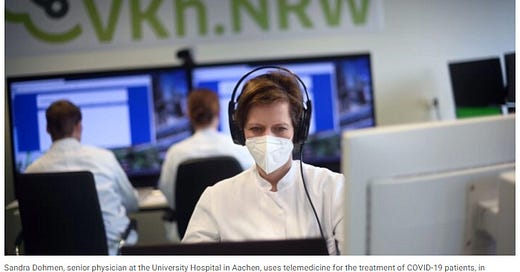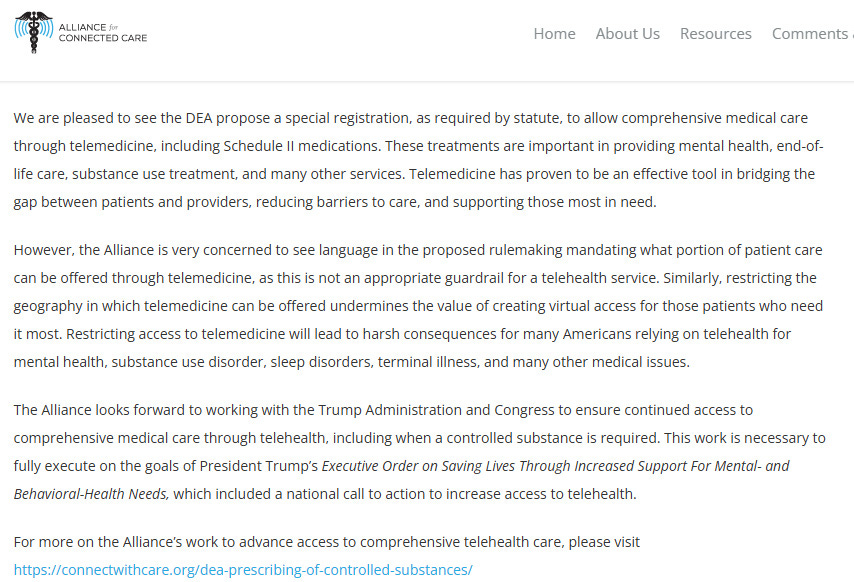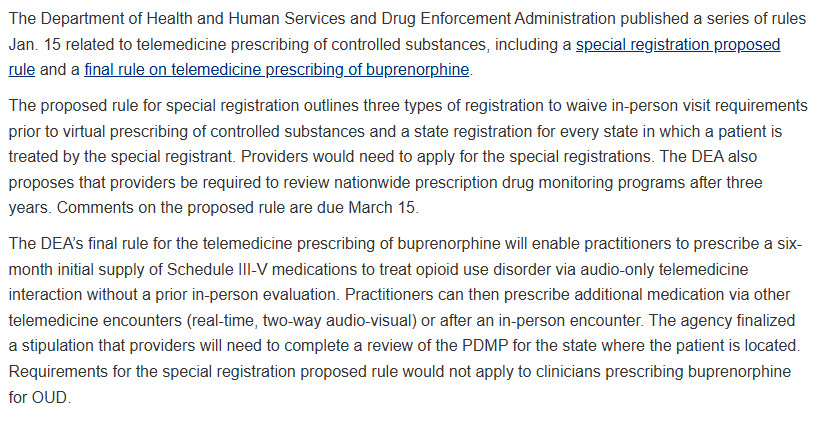U.S. Drug Enforcement Administration (DEA) Expanding Telehealth Access for Controlled Medications, Adding New Safeguards
New DEA telemedicine rules expand access to controlled medications while adding safeguards such as provider registration and stricter prescription monitoring.
By Chase Smith
January 19, 2025
The U.S. Drug Enforcement Administration (DEA) announced three new telemedicine rules on Jan. 16 aimed at expanding access to medical treatment while introducing new safeguards against prescription drug misuse.
The first rule allows health care providers to prescribe a six-month initial supply of buprenorphine—a medication used to treat opioid use disorder—through audio-only telemedicine consultations.
Pharmacists are also required to verify the identity of patients when dispensing buprenorphine.
However, patients must complete an in-person visit for any refills beyond the initial prescription.
The second rule introduces a special registration system for certain board-certified health care providers, such as psychiatrists, hospice care physicians, pediatricians, and long-term care physicians, allowing them to prescribe Schedule II-V controlled substances without prior in-person visits.
However, providers prescribing Schedule II medications may be required to be in the same state as the patient and could be limited to issuing no more than half of their prescriptions via telemedicine.
This registration comes with specific criteria and safeguards to ensure safe prescribing practices.
The third rule, developed with the U.S. Department of Veterans Affairs (VA), exempts VA healthcare providers from the special registration requirements.
Once a VA patient has had an in-person visit with any VA provider, other VA practitioners can continue prescribing controlled substances via telemedicine without needing additional registration.
Once a VA patient has had an in-person visit with a VA provider, other VA practitioners can continue treating the patient via telemedicine, ensuring uninterrupted care.
Additionally, telemedicine platforms that connect patients with prescribers must now register with the DEA.
Special registrants will also need to check a national Prescription Drug Monitoring Program (PDMP) after three years.
Until then, they must review PDMPs in the patient’s state, their own state, and any state with a sharing agreement.
“DEA’s goal is to provide telehealth access for needed medications while ensuring patient safety and preventing the diversion of medications into the illicit drug market,” DEA Administrator Anne Milgram stated.
“We understand the difficulties some patients have accessing medical providers in-person, and we want to ease this burden while also providing safeguards to keep patients safe.”
The announcement garnered mixed reactions from telehealth advocacy groups and healthcare organizations.
The Alliance for Connected Care expressed appreciation for the DEA’s progress on telemedicine prescribing of controlled substances but raised concerns about certain restrictions in the proposed rule.
The American Hospital Association (AHA) also weighed in on the newly released rules.
Department of Health and Human Services and Drug Enforcement Administration released rules related to telemedicine prescribing of controlled substances
The AHA acknowledged the DEA and HHS for addressing the need for telemedicine flexibility, particularly the finalized rule allowing practitioners to prescribe a six-month initial supply of buprenorphine via audio-only telemedicine to treat opioid use disorder.
However, the AHA highlighted concerns about the burden of requiring providers to register in every state where they treat patients and the necessity to review nationwide prescription drug monitoring programs after three years.
The AHA urged the DEA to consider reducing administrative hurdles to ensure health care providers can efficiently deliver care to patients across state lines.
While the DEA emphasizes that these rules are designed to maintain patient access to necessary medications while curbing misuse, critics argue that the additional layers of regulation may hinder timely access to care for some patients.
The public has until March 15 to submit comments on the proposed special registration rule.
READ MORE:








